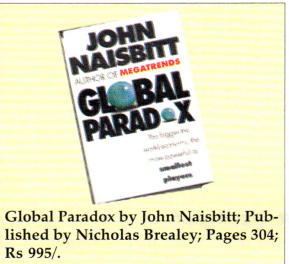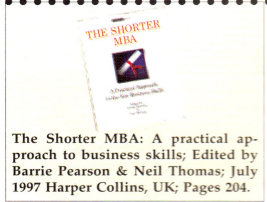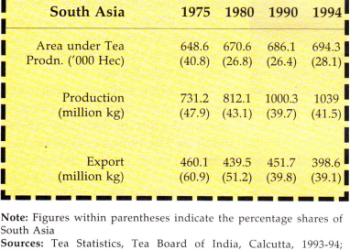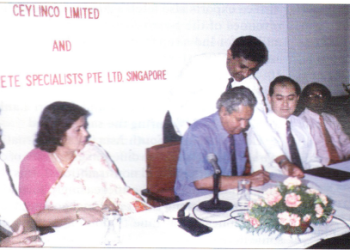Vijitha Yapa

John Naisbitt’s book is a re- minder of the parable told by Randall A Tobias, former vice chairman of AT & T. ‘A theologian asked the most powerful supercomputer, ‘Is there a God? The computer said it lacked the processing power to know. It asked to be connected to all the other supercomputers in the world. Still, there was not enough power. So, the computer was hooked up to all the mainframes in the world and all the mini-computers and to all the personal computers. And eventually it was connected to all the computers in cars, microwaves, VCRs, digital watches and so on. The theologian asked for the final time, ‘Is there a God?’ and the computer replied, ‘there is now!”.
John Naisbitt, former executive of IBM and Kodak and visiting fellow at Harvard University, needs no introduction to Sri Lankans. His book, Megatrends, sold 8 million copies worldwide, when he forecast accurately ten major patterns of change in the eighties. In this book, he stresses that the bigger the world economy, the more powerful its smallest players. While the global economy gallops, the larger organizations are beginning to crack up and the break up of the once close-knit USSR is perhaps the best example of this.
Similarly, it will be a matter of time when the current policeman of the world, USA, will also come under increasing pressure from within and without.
Naisbitt speaks of the nations which are establishing their own identities, with languages and currencies of their own. Small and medium sized firms are beginning to increasingly dominate the market place and that is the paradox spotlighted in this book. As the global economy gets larger, the individual units people, countries, small companies are becoming more powerful.
Naisbitt spotlights trends for which only the future holds the answers.
He predicts that the world will contain nearly ten times more countries than today and says while there will be more moves towards political independence and self-rule, the formation of economic alliances will be accelerated. Naisbitt also predicts the death of the central government idea and one wonders how many of our leaders look at this trend amidst the talk of devolution and more autonomy.
The importance of the entrepreneurs as the most important players in the next century is stressed while business conglomer ates will have to break themselves into smaller units if they are to survive.
Soren Kierkegaard from Denmark once said that ‘the paradox is the source of the thinker’s passion, and the thinker without a paradox is like a lover without feeling, a paltry mediocrity.”
Naisbitt is controversial. He predicts that in future there will be a world of 1000 countries, not the 200 or more of today. He says the nation state is dead because they are breaking up into smaller more efficient parts, like big companies. The modern leap in telecommunications not only informs the tremendous move towards democratic selfrule but monitors and makes transparent the character and nature of the process.
How many times has the cry been heard of where are the Churchills and De Gaulles of today? Naisbitt raises a fundamental question to such queries. Will they be irrelevant today? ‘As great as they were for their time, their brand of leadership would not necessarily work today,’ he says.
It is a revolution in information and thinking which will end representation democracy because with the crisis in political leadership the end of representative democracy is coming.
Why? Because, says Naisbitt, we are now in a position to know all we have to know as soon as everyone else knows it including those who represent us and therefore the need to have that kind of representative is unnecessary. He says we do not need to have people on the scene who have the knowledge and information to make judgements for us because we are also on the scene and have the same information and knowledge. But he points out that the only thing the representative on the scene has that the citizen at home does not have is knowledge of the culture of the institutions of government.
He wants a free market of ideas democracy, a consumer driven democracy that directly resolves issues eliminating representatives.
He speaks many home truths. ‘We are, all over the western world, in a political crisis because political leaders have ceased to be important. It is almost a universal condition in the west. But take away politics and there is no crisis.’ Any supporters of that theory?
He says countries don’t decide on the value of currencies any more. Individuals do. In Asian countries, this was clearly visible in July 1997 when currencies in Thailand, Philippines, Malaysia and Indonesia lurched downwards as currency raiders like George Soros started playing the games they know so well.
A provocative book which should stimulate the minds of many because though the views are controversial there is much food for thought. One cannot agree more with Naisbitt’s conclusion, ‘The Global paradox tells us that that the opportunities for each of us as individuals are far greater than at any time in human history.’

How many have the time to study for a Masters in Business Administration when time is so precious? Yet, in today’s highly competitive market environment, not understanding the issues involved in running a business can be fatal in many ways.
The Shorter MBA is edited by two specialists. Barrie Pearson is executive chairman of Livingstone Guarantee Ple who are specialists in acquisitions, management buyouts and corporate finance, while Neil Thomas is managing director of Hawkmere ple, seminar and training specialists. Practical tips and techniques from these experts abound through the length of this book on areas ranging from management skills, business development, personal development, competitive market strategy and even turning around a loss-making business.
The book is practical and sets out from the start by asking the reader to analyse himself/herself. To them, the starting point for high achievement in personal and business life is to review positively one’s strengths and weaknesses. They teach us that high achievement depends on identifying and setting goals and then setting about to make them happen by addressing the key issues involved. The aim must be high. One example may suffice. What is the quantum leap needed to triple profits in 3 years?
Time management plays a key role in this. How many of us do jobs that could well be done by juniors? But then in Sri Lanka there are other problems. Where do we find such personnel? In fact, this is a major problem faced by many firms today. The pace of advance has been so great in Sri Lanka in the last few years that the education system has not kept pace. Politicians in and out of power have continued to play foot- ball with the lives of people by experimenting with education for short-term political gains which has benefitted no one.
The book stresses on even small things that matter. One example is to make a list of less important events one should duck! Even stress management is important. Stress can be reduced by planning to use your time to tackle areas of concern. As for appearance of the office and personal tidiness these are areas which need to be looked at too.
They stress that when dead- lines are met, a word of encouragement, by writing a note or sending flowers or wine (did they not know about arrack?) is helpful. The time spent to develop a team is never wasted in the long run.
It was Tennyson who said more things are wrought in this world through prayer than many dream of. Perhaps the corollary is that more time is spent on meetings that many businesses think of. A key question thus would be whether the total amount of time spent by those attending meetings is justified? But perhaps the most vital component is whether the meetings start on the scheduled. time. The key to this is to treat starting time as sacrosanct.
Workaholics are dime a dozen. How many are resulta-holic? Another good piece of advice is to work on the important not the seemingly urgent, making decisions in time to make them effective and to challenge the status quo.
The book warns about some managers who leave the financial analysis completely to an accountant. As the financial analysis could make or break the decision to proceed, this is treated more as an abdication of responsibility rather than a delegation of the calculation involved.
Evaluation of people is another aspect which is stressed. In many organisations people continue to remain under-valued, undertrained and under utilised. It also raises issues like whether pay alone is enough of a motivation. Organisations will need to offer a total career development package in which pay is just an element.
This is important at a time when Stanford Research Interna- tional (SRI) in the US has identified a new breed of manager who seeks a career that mirrors his own personal values rather than those of the organization. The book is timely and there are many lessons for Sri Lankan companies as well as managers in it.
Vijitha Yapa, chairman of the Vijitha Yapa Group of Companies, is founder editor of 3 national newspapers (The Is land, Sunday Island and Sunday Times). He is Sri Lanka’s correspondent for a number of foreign publications including The Times, London.




